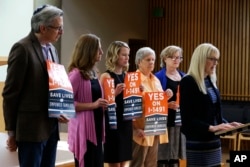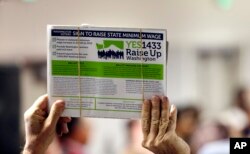Besides voting for president Tuesday, voters in 35 American states were deciding more than 150 policy issues that included legalizing recreational use of marijuana and restricting access to guns and ammunition. Voters also were deciding whether to mandate higher minimum wages and require performers in California’s pornography industry to use condoms.
Marijuana Use:
Florida voters Tuesday legalized medical marijuana, making theirs the 26th state to permit cannabis use for certain medical conditions. Voters in North Dakota and Arkansas did the same. Votes in Montana on the same initiative are still being counted.
California and Massachusetts voted to legalize recreational marijuana use for those older than 21, and Maine appeared to be headed for an approval. Votes were still being counted in Nevada and Arizona.
Gun Control
Ownership requirements: California, which has some of the nation’s toughest gun-related laws, has approved a measure that will outlaw possession of large-capacity ammunition magazines, require permits to buy ammunition and extend California’s unique program that allows authorities to seize firearms from owners who bought guns legally but are no longer allowed to own them.
In Maine and Nevada, a group founded by former New York City Mayor Michael Bloomberg spent millions promoting ballot measures that would require background checks on nearly all gun sales and transfers. Both contests were too close to call early Wednesday.
Protection order: In Washington state, voters approved a ballot initiative that would allow someone to get a court order that would temporarily ban people who show signs of mental illness or violence or another behavior that might indicate that they could harm themselves or others from possessing firearms.
Minimum wage
Increase: Arizona and Colorado voters approved measures phasing in a $12 minimum hourly wages by 2020. Maine voters appeared likely to approve a similar measure. In Washington state, where the minimum wage is $9.47 an hour, voters weighed raising that to $13.50 an hour by 2020. The federal minimum wage is $7.25 an hour.
Decrease: South Dakota lowers the minimum wage for those younger than 18 from $8.55 per hour to $7.50 per hour.
Death penalty
California: Early results show that Californians are rejecting a measure to repeal the death penalty. Voters appear to be endorsing a measure that would revise the death penalty rules would make changes designed to speed up the appeals and petitions process.
Reinstate: Nebraska voted to reinstate the death penalty that was banned last year. Nebraska has not executed an inmate since 1997; 10 men currently sit on death row.
Method of execution: Oklahoma residents approved a measure to make it harder to abolish capital punishment. It seeks to ensure the state has a way to execute prisoners even if a given method is blocked.
Education
Bilingual education: California voters have repealed a nearly two-decade-old mandate that students be taught almost exclusively in English in school.
Failing schools: Voters in Georgia overwhelmingly rejected an initiative that would have allowed the state to take over perennially failing schools.
Unusual measures
Safe sex: California rejected a measure that would require people in adult films to use condoms during sex scenes.
Doctor-assisted death: Colorado voted to allow adults diagnosed with terminal illnesses and facing imminent death to end their life with prescription medication. The measure will require three health professionals to confirm the prognosis of death and also confirm that the patient is making a voluntary and informed decision.
Statehood: Voters in the District of Columbia overwhelmingly approved a referendum to make the U.S. capital its 51st state, with poll goers saying they hope the vote puts pressure on the next Congress and president to address D.C.’s lack of representation in Congress.







